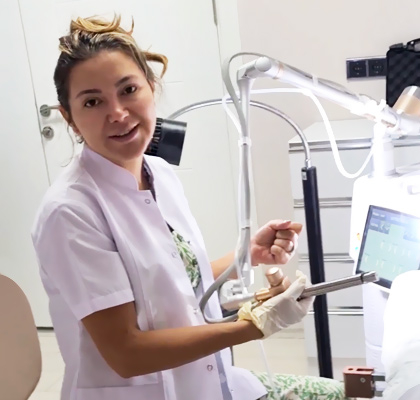
Laser vaginal tightening is also known as "non-surgical vaginal tightening." Medically, it is referred to as vaginal rejuvenation.
This procedure involves tightening and rejuvenating the entire vaginal canal using circumferential laser pulses.
With laser vaginal tightening, a woman’s sexual pleasure is enhanced, making it easier for her to reach orgasm and experience it more intensely.
In short, the laser technique strengthens the connective and supportive tissues beneath the vaginal canal. This results in vaginal tightening, rejuvenation, firming, and narrowing.
As women age, weakening of the connective and muscle tissues can cause vaginal loosening. Frequent childbirth, difficult deliveries, giving birth to large babies, and birth-related trauma can accelerate this process. Consequently, women and their partners may experience sexual problems.
Laser vaginal tightening is a non-surgical method applied to restore elasticity and firm the weakened connective and supportive tissues of the vagina.
Over time, factors such as collagen loss due to aging, complications from childbirth stitches, delivering large babies, difficult births, multiple consecutive deliveries, excessive weight gain and loss, and menopause-related issues can lead to vaginal wall laxity.
As a result of this laxity, insufficient muscle tone in the vagina can prevent both partners from experiencing full pleasure during intercourse.
Women experiencing vaginal laxity may find it difficult to achieve orgasm, leading to reduced sexual satisfaction. Over time, this can result in relationship issues and decreased sexual desire in both partners.
Laser vaginal tightening, a cosmetic procedure, offers a painless and non-invasive solution to these problems. This method eliminates sexual problems caused by vaginal laxity without pain or discomfort.
Laser vaginal tightening can be performed as soon as vaginal looseness and laxity become noticeable. It is safe to undergo this procedure six to nine months after childbirth.
Since this treatment does not involve incisions, stitches, or tissue removal like traditional vaginal tightening surgery, women can easily undergo the procedure in clinics.
At our clinic, patients can achieve a tighter and firmer vagina in just 10–15 minutes with a painless and comfortable procedure. The laser vaginal tightening treatment is typically performed once a month for a total of three sessions.
Laser vaginal tightening is an effective treatment for women experiencing vaginal laxity, which leads to reduced sexual pleasure and satisfaction.
In addition to vaginal tightening, this procedure can also successfully treat mild urinary incontinence caused by activities such as laughing, coughing, heavy lifting, or sneezing.
One of the most common concerns among menopausal women is vaginal dryness, which can cause painful intercourse. Laser vaginal rejuvenation is an effective treatment for this issue. It restores vaginal youthfulness, eliminates pain during intercourse, and improves natural lubrication.
This procedure can be performed on any sexually active woman, regardless of age.
Furthermore, laser vaginal tightening is frequently used to treat women who suffer from recurrent vaginal infections. By restoring vaginal health and balancing the vaginal flora, this treatment helps prevent frequent infections.
Laser vaginal tightening is performed using a vaginal probe approximately 10-12 cm in length, which is inserted into the vagina.
It is applied in sessions at intervals of 4 to 6 weeks. This procedure rejuvenates and renews the vaginal tissue. If needed, a single maintenance session can be performed later. In some cases, the procedure can be repeated every 2 to 4 years to maintain the results.
We frequently use laser vaginal tightening for the treatment of mild to moderate vaginal laxity. This procedure aims to restore the vagina’s original elasticity. Similar to vaginal tightening surgeries, laser vaginal tightening is best performed right after a woman’s menstrual cycle ends. During this period, hormone levels are higher, which enhances healing and provides faster results.
Laser vaginal tightening offers numerous advantages over surgical vaginal tightening procedures. Additionally, if the patient experiences urinary incontinence, the treatment has been observed to improve this condition by 80-90%. The laser stimulates the regeneration and rejuvenation of vaginal tissue.
The renewal process begins in the third week after the procedure and continues with collagen regeneration until the sixth week. As a result, the vagina becomes tighter, leading to increased sexual satisfaction.
During the laser vaginal tightening procedure, local anesthetic creams are applied to the vaginal entrance. Apart from this, no anesthesia or painkillers are required. Compared to vaginal tightening surgeries, this method carries significantly lower risks. The procedure is painless and comfortable. Any potential complications depend on the nature and intensity of the application, but they are generally minimal or even nonexistent.
Unlike surgical vaginal tightening, laser vaginal tightening is a repeatable procedure. Depending on the patient’s needs, it can be repeated every 2 to 4 years. For patients who desire even more tightening, annual treatments can be performed.
Laser vaginal tightening does not impose any restrictions on the patient’s daily life. The patient walks into the clinic and resumes normal activities immediately after the procedure. No rest or recovery time is required. For these reasons, this method is highly preferred, and we receive a high number of applications for it at our clinic.
Many patients are curious about the success rate of laser vaginal tightening. This method, which uses carbon dioxide laser technology, increases collagen density and promotes the formation of new blood vessels along the entire vaginal canal. This allows the vaginal walls to regain their youthful structure and ensures successful results.
Women who experience reduced sensation during intercourse, complain of vaginal laxity, or hear a gas-like sound during intercourse can easily eliminate these problems after three sessions. The vagina becomes youthful, firm, and elastic again. The vaginal walls grip the partner’s penis more tightly, leading to enhanced mutual sensations during intercourse. As a result, both partners experience increased pleasure, improved orgasms, and reduced sexual dissatisfaction or relationship issues.
One of the key differences between laser vaginal tightening and surgical vaginal tightening is its beneficial effect on vaginal dryness. Additionally, laser vaginal tightening helps restore the vaginal pH balance, improving vaginal flora and preventing frequent vaginal infections.
Considering all these advantages, dear readers, laser vaginal tightening is a highly advantageous method compared to surgical vaginal tightening. It is a quick procedure with no surgical risks and delivers effective results. No painkillers or anesthetics are required, as local anesthetic creams provide a painless experience. The risk of complications is significantly lower compared to surgical procedures.
Moreover, laser vaginal tightening does not only address vaginal laxity but also helps treat gynecological issues such as excessive vaginal wetness, vaginal dryness, urinary incontinence, and recurrent vaginal infections. Both female and male partners notice the vaginal tightening effect as early as 15-20 days after the first session. They also report increased sexual sensation. Studies in the literature and feedback from our patients confirm that this improvement continues to increase with each session.
The use of fractional laser, specifically carbon dioxide (CO₂) laser, for treating cervical erosions (cervical ectropion) began in 1973. Since then, laser technology has continuously evolved and has become widely used in gynecology.
Although it gained popularity in the late 1980s, in the early 1990s, governments aimed to reduce healthcare costs, leading to the adoption of more affordable technologies. This temporarily decreased the usage and effectiveness of laser treatments. However, in recent years, CO₂ laser technology has made significant advancements, regaining popularity over the last 20 years. Just as in many fields of medicine, it has also found its place in gynecological treatments.
The carbon dioxide laser has a wavelength of 10,600 nanometers, a penetration depth of 0.1-0.5 mm, and a thermal damage width of 0.5 mm beneath the skin, making it an extremely safe method. These safety margins ensure that surrounding organs remain unaffected, thereby allowing a broader range of applications while safeguarding the bladder, ureter, urethra, and intestines.
Beyond vaporization, CO₂ laser technology has also evolved to enhance power density, allowing its use in excision and incision procedures. This has paved the way for performing labiaplasty procedures in clinical settings.
Although CO₂ laser treatment may seem like a new method, it is not. It was developed in 2004 and has been validated as a reliable technique through numerous studies in medical literature. In fractional treatment, the laser beam is divided into multiple microbeams, which target and destroy only the lesion without affecting the surrounding normal tissue. This makes it more advantageous compared to surgical methods.
CO₂ lasers can be utilized for various treatments by using different setups, applicators, and handpieces.
First, the patient is positioned on a gynecological examination table. A vaginal speculum, which is a single-use instrument, is inserted to provide visibility. To enhance the laser’s effectiveness, any moisture inside the vagina is dried using gauze. Then, using the vaginal applicator shown in the image above, multiple laser shots are delivered 360 degrees along the entire vaginal canal.
These microscopic laser shots stimulate collagen production in the vaginal walls. New blood vessels form, rejuvenating the area. In our clinic, we observe that even after the first session, patients with urinary incontinence or orgasm difficulties experience significant improvement.
Unlike surgical vaginal tightening, laser vaginal tightening does not require fasting, general anesthesia, or spinal anesthesia. This is because the inner two-thirds of the vagina does not perceive laser pulses. For the outer one-third, which has sensory nerves, a local anesthetic cream is applied and left for 5-10 minutes before the procedure begins.
The procedure takes approximately 10-15 minutes. After the treatment, patients can immediately return to their daily activities without any downtime. A mild dark-colored discharge is normal post-procedure. While some clinics advise avoiding sexual intercourse for seven days, in our clinic, we recommend refraining from intercourse, swimming, and vaginal douching for only three days following the treatment.
The ideal time interval between sessions is at least three weeks and at most six weeks. Typically, for optimal results, we recommend a treatment plan of three or four sessions, spaced one month apart.
The need for maintenance sessions depends on factors such as the patient's body structure, childbirth history, degree of vaginal laxity, and age. A touch-up session can be performed as early as one year later if necessary. Generally, repeat treatments are considered every 2 to 4 years, as collagen loss naturally occurs in the vagina over time, just as it does in other parts of the body due to aging.
Both women and their partners usually begin noticing the effects of the procedure approximately three weeks after treatment. The effectiveness increases after the second session and reaches its peak after the third session.
Now, let’s take a look at how the vaginal wall appears histologically under a microscope before and after CO₂ laser treatment.
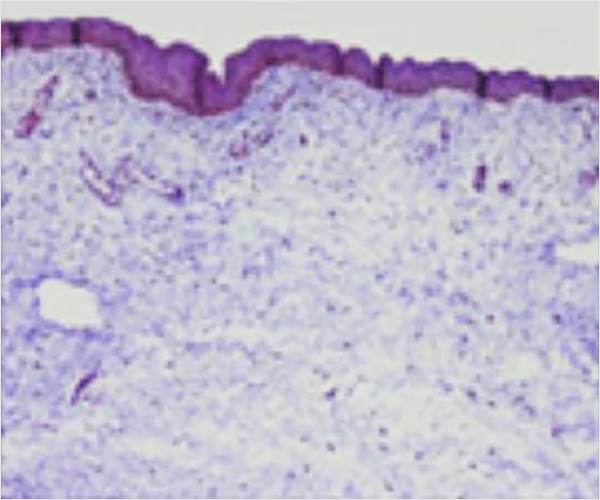
Histological view of the vaginal wall under the microscope before laser application.
The darkest colored part at the top is the outermost layer of the vagina, known as the vaginal mucosa, which is the visible pink area. As you can see, this vaginal wall has significantly thinned, lost its ridged structure, and its function has deteriorated. Now, let's take a look at the same area under the microscope one month after a vaginal carbon dioxide laser application.
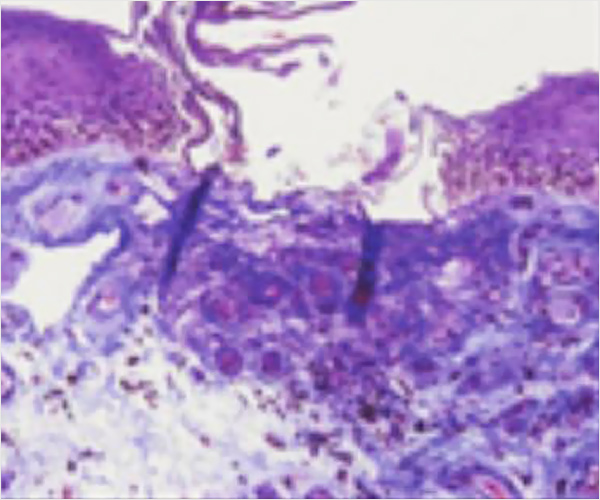
Histological image of the vaginal wall under the microscope after laser application.
Let's observe how the tissue appears histologically under the microscope immediately after the laser application. As seen, the laser creates minimal damage on the mucosa, inducing thermal injury that stimulates regeneration and increased blood supply in the area. Now, let's examine the vaginal mucosa histologically under the microscope approximately one month after the CO₂ laser application and see what changes have occurred.
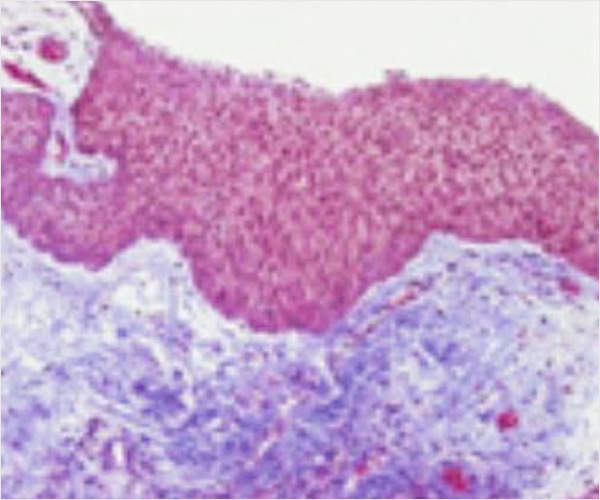
Histological image of the vaginal wall under the microscope one month after laser application.
Now, let’s observe together how the vaginal wall tissue has improved. As you can see from this photo, the dark blue and purple-colored outer vaginal mucosa has thickened and changed noticeably side by side. These images clearly reveal the changes in the vaginal wall under the microscope.
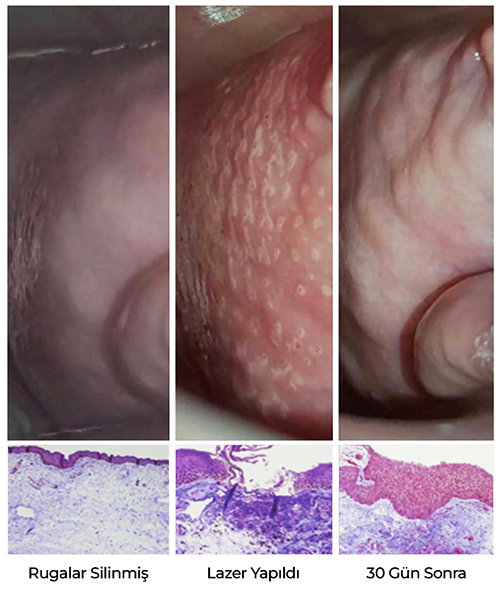
Dear reader, although I am a urogynecologist, pelvic floor surgeon, and genital aesthetic specialist who frequently performs these surgeries, I must acknowledge that the effectiveness of vaginal tightening with laser is evident both from the feedback of my patients, the literature, and the noticeable difference you can see in the photos.
Doctors in this field are divided. Many well-known doctors on social media claim that lasers are ineffective and prefer surgical methods. However, women who have undergone this procedure at our clinic have reported significant improvements. They have expressed that their sexual satisfaction has increased, urinary incontinence issues have resolved, vaginal discharge has balanced, vaginal dryness is no longer an issue, and instead of pain, they now experience satisfaction during sexual intercourse. They also mention that they no longer suffer from frequent vaginal infections, as they did in the past.
In this context, with the FraxiVa laser device in my clinic, I am effectively addressing requests for vaginal tightening, relieving patients of their issues, and helping them feel more at ease.
For laser vaginal tightening, strengthening, and urinary incontinence treatments, we typically recommend one session per month, totaling 3 to 4 sessions. Effective results are usually seen after the second, sometimes the third session. One booster session a year helps maintain the results for a longer period.
Since collagen production and breakdown is a continuous process in the human body, and it progresses in cycles, laser treatments can be repeated every 2 to 4 years depending on the individual’s age, genetic structure, vaginal wall thickness, diet and exercise habits, and whether they smoke or drink alcohol.
Laser vaginal tightening is one of the most preferred methods both worldwide and in our country. It provides highly satisfactory results in terms of patient satisfaction. Especially for those who do not wish to undergo surgery, using this as an alternative to surgery offers significant advantages in terms of complication risks.
We accept patients from Konya, other cities in Turkey, and abroad for laser vaginal tightening, urinary incontinence issues, vaginal rejuvenation, vaginal tightening, vaginal dryness treatment, and treatment for recurrent vaginal infections at our clinic in Konya. Pricing varies based on the number of sessions, as well as additional treatments like fillers and serums, and depending on the patient's complaints and diagnoses. You can get more information about fees by calling our clinic's secretary and scheduling an appointment.
We frequently receive patients from Konya and many other cities and regions in Turkey for laser vaginal tightening. This method is one of the most preferred tightening methods due to the absence of pain or discomfort during the procedure, and the fact that patients can easily return to their daily lives afterward.
At our clinic in Konya, laser vaginal tightening can also address urinary incontinence issues if present, help with orgasm difficulties, and enhance sexual satisfaction and fulfillment for both the individual and their partner. We also offer this treatment effectively for vaginal dryness, frequent vaginal infections, and for women experiencing excessive vaginal wetness and numbness during sexual intercourse.
Laser vaginal tightening is a new procedure that promotes vaginal tissue renewal, rejuvenation, and tightening due to the thermal (heat-producing) and ablative effects of laser light. It has been used worldwide since the early 2000s and has become a popular choice for gynecologists in Turkey over the past decade. Laser vaginal tightening, vaginal rejuvenation, and laser vaginal rejuvenation are terms commonly used to describe this method. It is a non-surgical, stitch-free, painless, and anesthetic-free technique to tighten and rejuvenate the vagina in an office setting.
This method aims to strengthen the collagen connective tissue in the vaginal wall, enhance blood flow, and promote the formation of new blood vessels, ultimately increasing sexual pleasure and sensitivity, as well as improving sexual satisfaction. It is frequently applied in clinical settings to alleviate menopausal issues, reduce recurrent vaginal infections, and improve orgasm function. Many patients visit our clinic for these purposes. Our clinic's contact number is 0501 242 18 81, and you can also get detailed information and make an appointment via WhatsApp.
Karaman is one of the cities outside Konya from which we receive a significant number of patients for vaginal tightening. Many patients from Karaman visit us for carbon dioxide laser treatment to rejuvenate, tighten, and restore the vagina to its former shape. With carbon dioxide laser, the vaginal tone is restored to its original tightness, blood circulation increases, and neural excitability is improved, enhancing sexual pleasure and satisfaction.
Over time, vaginal walls can lose their tone and become deformed due to factors such as difficult and traumatic deliveries or large babies. After three sessions, the vaginal wall is restored to its original shape. Patients typically begin to notice results 20 days after the first session, with couples reporting increased pleasure in their sexual experiences. This method also effectively addresses issues such as vaginal wetness, vaginal dryness, urinary incontinence, and recurrent vaginal infections.
Laser vaginal tightening has become popular not only worldwide but also in Turkey. The reason for this is that it is a painless, non-surgical procedure with minimal complications, allowing patients to return to their daily lives quickly.
As a result, it is frequently preferred by both gynecologists and patients. We receive a large number of patients from Antalya at our clinic in Konya for this procedure. Gynecologists in Antalya perform this procedure less frequently, or in clinics that do, they tend to charge higher prices due to the region being a tourist destination. For this reason, many of our patients choose to visit our clinic to benefit from this service at more affordable prices, while also enjoying a visit to Mevlana.
Laser vaginal tightening, rejuvenation, and strengthening are performed on the same day with no pain or discomfort. The procedure typically lasts 10-15 minutes. Prior to the procedure, the vaginal entrance is desensitized with local anesthetic creams, ensuring the patient is comfortable during the treatment and continues to feel at ease for an extended period afterward. Patients can return to their home cities the same day and resume their daily lives, including work, without any disruption. For this reason, we must acknowledge that laser vaginal tightening is superior to surgical methods.
Laser vaginal tightening, when combined with the procedure, also enhances sexual sensations and pleasure, helps resolve vaginal dryness issues, addresses frequent vaginal infections, and contributes to alleviating vaginal dryness problems. Furthermore, after the laser vaginal tightening procedure, we frequently observe that urinary incontinence issues improve by 80-90%.
Approximately three weeks after the laser vaginal tightening procedure, both female and male partners experience a noticeable tightening sensation and an increase in pleasure during intercourse. This treatment has significantly positive effects not only for the woman but also for the couple's relationship.
When the vagina is scanned 360 degrees with laser treatment, it rejuvenates the vaginal tissues, promoting tissue renewal, tightening, and narrowing of the vagina. So, how does the laser create these effects? Laser light creates a thermal and controlled destructive effect on the vaginal walls and the supporting structures just beneath the vaginal wall, causing mild and temporary damage to the vaginal canal. This temporary damage triggers an inflammatory process in the body.
New blood vessel formation occurs in the areas of controlled damage, promoting the migration of repair cells called fibroblasts to the site. These fibroblasts facilitate the re-synthesis and organization of collagen and elastin connective tissue. With the increased synthesis of connective tissue, the tissue is regenerated, renewed, and tightened, leading to vaginal narrowing.
Female orgasm is influenced by many factors. If there are no psychological issues, and if vaginal insensitivity is caused by vaginal enlargement, meaning the woman cannot feel enough sensation from the penis, laser vaginal tightening can be applied to treat orgasm issues in sexually active women. The laser improves the blood flow to the tissue by promoting new blood vessel formation, rejuvenating the tissue and making it more sensitive neurologically.
Laser treatment is also used for women with sexual pleasure issues, and we have observed effective results in many of our patients. When applied intensively to the anterior vaginal wall (G-Spot),the laser treatment sensitizes the nerve endings in this area, improves blood flow, and rejuvenates the tissue, facilitating clitoral and vaginal orgasms.
What does this mean? In women who do not enjoy sexual intercourse or cannot reach orgasm during vaginal penetration, laser vaginal tightening combined with PRP (Orgasm Injection) has yielded very effective results. Vaginal penetration refers to the movement of the penis in and out of the vagina. In addition, since the laser treatment also increases vaginal lubrication, it also boosts neural stimulation, allowing the woman to reach orgasm more easily and experience more intense and higher-quality orgasms. This has been frequently observed both in clinical practice and in literature studies. In short, CO2 laser treatment enhances sensation during sexual intercourse, increasing pleasure and satisfaction.
We frequently accept patients for this purpose in our clinic. You can schedule an appointment by calling 0 501 242 18 81. The procedure is painless, without discomfort, and lasts approximately 10-15 minutes, allowing you to return to your daily life immediately after. The procedure is usually done in three sessions, with one session each month.
Laser vaginal tightening and rejuvenation can be performed on all women who are sexually active and have no age limit, whether or not they are virgins. It offers an effective solution for couples experiencing vaginal enlargement, looseness, and insensitivity during intercourse.
Often, the male partners of these women report feeling like they are in a "void" during intercourse, expressing reduced sensation. Women also report feeling that they cannot adequately grasp their husband's penis. At the same time, the men report experiencing reduced pleasure as they feel they are in a "void." When this problem in the couple's relationship is not resolved, it can lead to sexual pleasure and desire problems, sexual reluctance, conflicts between the couple, and even infidelity.
At our clinic and many others, fractional CO2 laser devices are used for this procedure. The entire vaginal canal is treated with laser shots all around, and the procedure typically takes 10-15 minutes in a clinical setting, providing painless and comfortable vaginal tightening.
The entire vaginal canal is scanned with CO2 laser shots in both horizontal and vertical directions. A thermal heat of approximately 50-60 degrees is generated beneath the tissue. There is no pain or discomfort during the procedure, as local anesthesia is applied to the entrance for comfort. After the procedure, you can walk out of the clinic without needing any rest, and resume your work and social life. It is often performed during lunch breaks for working women.
After CO2 laser vaginal tightening, you can leave the clinic and return to your social and work life without needing rest. It is entirely normal to experience light, watery discharge with slight blood for the first week after the procedure.
Laser vaginal tightening does not cause any side effects on surrounding organs or other parts of the body. This is possible as long as the laser intensity is set at the correct dose. No major complications have been reported in any patients worldwide after CO2 laser vaginal tightening.
At our clinic, we have not encountered any side effects in any of our patients. After the procedure, it is advised to drink plenty of fluids for a few days, and sexual activity should be restricted for 3-7 days. Some patients may experience mild burning while urinating, fatigue, or headaches. In such cases, if deemed appropriate by your physician, over-the-counter medications like paracetamol may be taken.
In some CO2 laser devices used outside our clinic, where the appropriate dose range cannot be selected or the vaginal penetration depth cannot be adjusted, we have unfortunately observed vaginal burns in patients referred to us.
Considering the patient’s age, vaginal tissue condition, tissue thinness, vaginal dryness, and other underlying systemic conditions, I recommend working with devices that allow adjustments to the appropriate dose range and penetration depth before laser treatment. The FraxiVa CO2 laser device used in our clinic offers this ease of use.
We first recommend that the patient undergo an examination by a gynecologist. Laser vaginal tightening can be performed on patients who are not pregnant, have no vaginal infections, and do not have cervical lesions, by an experienced gynecologist.
It should never be performed on patients with cellular changes in their smear results or on pregnant women. This procedure is also not suitable for those with excessive expectations or those diagnosed with body dysmorphic disorder. In addition, women with advanced vaginal prolapse, vaginal enlargement, uterine prolapse, bladder prolapse, or intestinal herniation may not benefit from laser vaginal tightening.
Laser treatment is not applied to patients with active genital warts, herpes infections, uncontrolled diabetes, or those with immune system problems. It is also not recommended for patients with suspected cancer, photosensitivity, or light allergies.

- I will be coming back with my friend, who will also have surgery!
- I suffered from large and asymmetrical labia ever since I reached puberty
- I had laser and P*R*P treatment for incontinence problem.
CommentsLast Tuesday, I had surgery performed by Dr. Azer. I underwent vaginoplasty due to issues with a widened vagina and slightly enlarged labia. I was quite nervous about traveling from Europe {...}
10.02.2025Dear Dr. Azer, I suffered from large and asymmetrical labia ever since I reached puberty. For a long time, I thought it was normal, but as I aged it has become a bigger issue and started b{...}
31.12.2023I had a problem with incontinence, I came here and received laser and p*r*p treatment, I took 2 sessions. I saw 90% benefit, may god be pleased{...}
28.12.2022